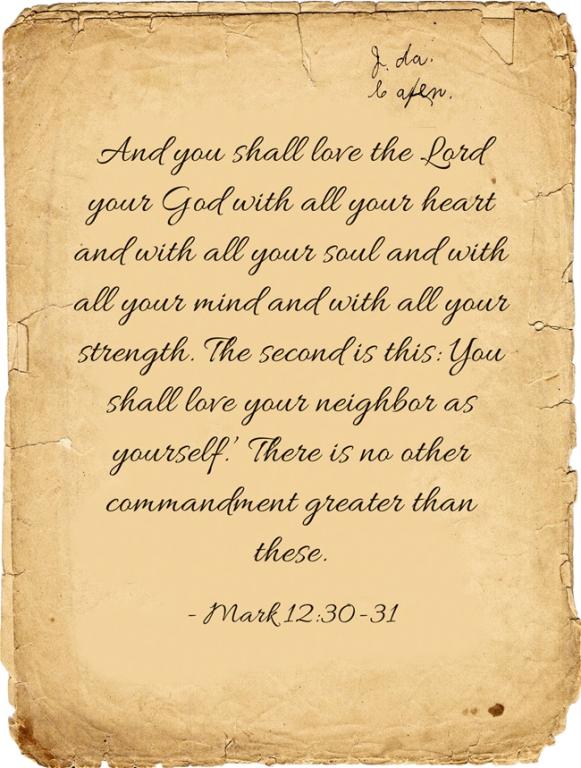Here is a Sunday school lesson or Bible study about loving your neighbor.
Loving God First
Mark 12:30-31 “And you shall love the Lord your God with all your heart and with all your soul and with all your mind and with all your strength.’ The second is this: ‘You shall love your neighbor as yourself.’ There is no other commandment greater than these.”
Mark 12:30-32 is when Jesus had told the scribes what the greatest of all the commandments were as a response to the time when “the scribes came up and heard them disputing with one another, and seeing that he answered them well, asked him, “Which commandment is the most important of all” (Mark 12:28). After one of the scribes answered correctly “Jesus saw that he answered wisely, he said to him, “You are not far from the kingdom of God.” And after that no one dared to ask him any more questions” (Mark 12:34). We too are near the kingdom when we love God first and foremost (Matt 6:33) and then love our neighbor in the same way that we love ourselves.
Is it humanly possible to love God with all our “soul and with all [our] mind and with all [our] strength?
How do we love ourselves?
How can we love our neighbors when they are hard to love?
Loving our Neighbor
Galatians 5:14 “For the whole law is fulfilled in one word: “You shall love your neighbor as yourself.”
This amazing statement of Paul’s declared that “the whole law is fulfilled in one word” or one sentence and that is “You shall love your neighbor as yourself.” What law was this fulfilling? Is the command to love our neighbor found in the Old Testament? Yes, as it says in Leviticus 19:18 “You shall not take vengeance or bear a grudge against the sons of your own people, but you shall love your neighbor as yourself: I am the LORD.” Part of loving our neighbor means we won’t bear a grudge or not forgive them and neither should we seek to take revenge into our own hands. That is not love but that is seeking to seat ourselves on the throne of God and it’s a one-seater! Instead, Paul tells us to “never avenge yourselves, but leave it to the wrath of God, for it is written, “Vengeance is mine, I will repay, says the Lord” (Rom 12:19) and to “Repay no one evil for evil, but give thought to do what is honorable in the sight of all” and as much as “possible, so far as it depends on you, live peaceably with all” (Rom 12:17-18) because “Love does no wrong to a neighbor; therefore love is the fulfilling of the law” (Rom 13:10).
Why isn’t it loving to seek revenge against our neighbor?
How isn’t it loving to hold a grudge against our neighbor?
How hard is it to wait on God for Him to repay all evil done against us?
Loving our Enemies?
Matthew 5:43 “You have heard that it was said, ‘You shall love your neighbor and hate your enemy.’”
In the Beatitudes, Jesus said some very shocking things like “Love your enemies and pray for those who persecute you” (Matt 5:44) and we are to do this “so that you may be sons of your Father who is in heaven. For he makes his sun rise on the evil and on the good, and sends rain on the just and on the unjust” (Matt 5:45) because “if you love those who love you, what reward do you have? Do not even the tax collectors do the same” (Matt 5:46)? How are we any different from the world if we only show love to those of our own household? Next, there is even more radical teaching where Jesus says “Love your enemies, do good to those who hate you, bless those who curse you, pray for those who mistreat you” (Luke 6:27-28). Really Jesus?! Do good to those who hate us and pray for those who mistreat us and bless those who curse us? Yes! That’s because “while we were still sinners, Christ died for us” (Rom 5:8) and “while we were enemies we were reconciled to God by the death of his Son, much more, now that we are reconciled, shall we be saved by his life” (Rom 5:10). Paul’s point is that we were once enemies of God but God still sent His Son “at the right time Christ died for the ungodly” (Rom 5:6) which means us!
Why is it hard to pray for and bless those who hate us and curse us?
Do you consider anyone your enemy? Have you prayed for that person?
Do we tend to only show love to those that are our family and church members?
Who is our Neighbor?
Luke 10:29 “But he, desiring to justify himself, said to Jesus, “And who is my neighbor?”
In the Parable of the Good Samaritan Jesus said that the true neighbor who was loving was the one who went out of their way to help someone who had been beaten and robbed (Luke 10:3) but the supposedly religious ones avoided the man, so much so, that when they “saw him he passed by on the other side” (Luke 10:342b) hoping to not get involved which is much like our society today. When a Samaritan was the only one who helped (Luke 10:33-36), Jesus showed that the real neighbor is not the person who is trained in religion or the religious type but the one who actually helped, and in this case it came from someone who the Jews absolutely despised; the Samaritans. Jesus asks the listeners “Which of these three, do you think, proved to be a neighbor to the man who fell among the robbers?” He said, “The one who showed him mercy.” And Jesus said to him, “You go, and do likewise” (Luke 10:36-37).
Do we assume some people will be more loving because of who they are or what they do?
Does it sometime appear that the least likely person to help is sometimes the very one that help?
Have you ever been a “good Samaritan?”
Conclusion
I urge you in your study to look at all of the Bible verses and read them aloud in the class so that you can get the most out of this lesson on loving our neighbors as ourselves but an important point that Jesus made was our neighbors are more than those who live next door. Just look at everyone you see as your neighbor because they too were created in the image of God (Gen 1:27) so we must treat others the way that we would like to be treated and loving our neighbors might be taking care of them just as we take care of ourselves. The end purpose is “so that you may be sons of your Father who is in heaven. For he makes his sun rise on the evil and on the good, and sends rain on the just and on the unjust” (Matt 5:45).
Does it make sense that we should treat others in the same way that we treat ourselves?
Is it hard to see the “image of God” in people?
What have you learned about loving your neighbor in this study?
Article by Jack Wellman
Jack Wellman is Pastor of the Mulvane Brethren Church in Mulvane Kansas. Jack is also the Senior Writer at What Christians Want To Know whose mission is to equip, encourage, and energize Christians and to address questions about the believer’s daily walk with God and the Bible. You can follow Jack on Google Plus or check out his book Teaching Children the Gospel available on Amazon.
















